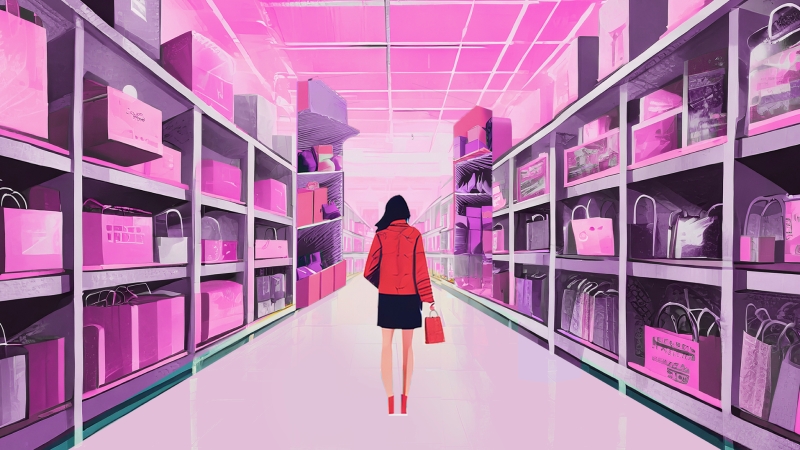Is it Fair? Can Trade Shows Compete with Venture Backed Online Marketplaces?

Article exclusively sponsored by Meet Ribbon
It’s a conversation happening behind closed doors, in boardrooms and on the showroom floor: how have online wholesale platforms changed the trade show industry? We wanted to lift the curtain on this debate and have an honest conversation on the impact of Faire and similar platforms. So we brought in a panel of experts from all over the retail ecosystem: sales agency owners, exhibitors, trade show organizers and retail buyers to give their opinion on what it all means and how the industry should pivot.
Ribbon’s Co-Founder and CEO Vinit Patil moderated our panel of experts including:
- Owner of San Francisco gift shop Perch, Zoel Fages
- Owner of sales agency Karen Alweil Studio, Karen Alweil
- Founder of home goods line Soil to Studio, Swati Bansal
- London Design Fair Founder and Ribbon’s Global Fairs Liaison Director, Jimmy MacDonald
Please find highlights below and watch the full roundtable here.
How the Balance Shifted
There’s no doubt that the pandemic played a role in the shift from attending trade shows to doing more online shopping. Based in San Francisco, Zoel was an early adopter to this changing landscape:
“I was first introduced to Faire when they were Indigo Faire and I was super skeptical. Just the way that I had been buying through reps and going to gift shows was fun and part of the creativity of owning a store. And then to have this option, you don't need to go anywhere, you can just do it all from a platform, [at first] I was really skeptical, and in the beginning, I used it very little. But I have to say, at the onset of the pandemic [things changed]. These incentives that you talked about, like 60 day payment terms, sometimes they've done 90 day payment terms. They run these specials, where you get discounts on purchases from various brands, it’s all very appealing.”
Karen Alweil, Owner of Karen Alweil Studio, a sales rep agency that’s been in business for 30 years, sees the emergence of online marketplaces as simply a new way of doing business:
“I've done this a long time, and I think that over the years of being in business, I've seen many changes over that time. Like any of the various things that have happened in our industry, I view any of the wholesale online platforms as just a new way of doing business. I welcome them and I think that they're just new and different ways of doing things. For us, it has made us better at our job. They’ve made us really think about how we do what we do every day [and be] much more efficient at everything we do. That includes marketing to relationship building to learning our stories, having more information and better training from our brands and social media. Everything across the board. It has proven to be very successful for us because our business has grown dramatically over the last few years. I think that's really important for retailers and brands to know, because I think they view sales agencies as dying, and we're not at all, our business has grown dramatically.”
Incentives: A Sustainable Model?
Over the years we’ve witnessed Airbnb, Lyft, Uber and delivery apps increase prices and fees as investor capital dries up and the companies have to financially stand on their own. These start-up trends have led many to question the longevity of incentives offered by Faire and similar platforms. Obviously these incentives are designed to entice retail buyers in particular. Zoel explained how they influence his buying patterns and what it would mean if they were to end:
“I honestly don't think about it, because it's not part of my day to day. And if it were to change and kind of go back to where they weren't there, it just would be a different way of managing product flow. [I always need to focus] on things that truly drive my business. One of the cool things [about Faire] is being able to try products. If it doesn't work, you can send it back. If that were to dry up, it just makes me have to work a little harder, which is fine. But it has been a really good way to get introduced to different brands, things that I think are cool.”
Despite the many benefits of these incentives for retailers, they often come at a price to brands. Swati described the challenges of the Faire model from her perspective:
“The commission structure for a small business, it's really hard to absorb like 25% on an opening order. So even if we feel that maybe it will translate into a long term relationship, most of the time, it really hasn't. The size of the orders are way smaller, on Faire or in any other online platform, because most of the time retailers just want to meet the opening, or just want to try out the product, which is fine. But I feel that they don't really go deep into the line sheet, and without getting into a wide range of our products, it's hard to tell the story of the brand.”

The Heart of Trade Shows: Personal Connections
A big part of B2B sales is storytelling: a buyer has to personally connect with the product they’re selling in stores. All three panelists made a point of discussing the importance of brand storytelling as experienced at a trade show booth or working with a sales rep. Swati Bansal gave a thorough run down of how online wholesale platforms work from a brand’s perspective and how it just hasn’t compared with her success at trade shows:
“As a brand, over the last four years, I haven't been able to successfully drive solid long term relationships through online platforms. So I sell on Faire very selectively, I would say maybe 5- 8% of my wholesale business comes from Faire, which is very negligible… I really personally believe in physical trade shows as a new business. [You get to see] the way we sell our story, the way we connect long term with the retailers. I see it as a long term relationship, which is hard on an online platform. The face to face connection we have when we meet the retailers is unparalleled, and it's hard to get that online.”
Karen mirrored many of Swati’s sentiments but from the perspective of a sales rep agency with showroom spaces throughout the US:
“I always joke that we all have these outside families during trade shows that our families don't even know about. Because we all spend so much time together, it's like camp. [It brings me back] to the experiences we had during Covid. Everything you had to do to manage getting through the day to pay your rent, to survive, to do all those things. To have seen the retailers and brands and reps all work together, when they were in person to be able to help each other figure that out, to discuss different ways they managed social media and increase their sales and use their reps and do all those things: it was incredible. It was like triage at a hospital to watch that.”
For Karen and many others, the community building that happens at a trade show can be something you tap into for many years to come. Those communities can actually be a life saver.
Curation VS Algorithms
Beyond the benefits of building lasting relationships through in person connection, there are challenging aspects of the online platform experience including fees, order size and hoping the algorithm shows your line as Swati explained:
“Even the orders we get online are because people might have seen us in the trade shows and then they go online and place the orders. Faire has [tons of] brands and I don't know how the algorithm works. So it’s hard for small brands to be able to come at the top of the listing. I haven't gotten many new orders just on its own.”
Zoel mentioned feeling a similar sense of confusion due to Faire’s algorithm of brands and products:
“There is so much noise in their selection, that it's starting to become what I had an issue with at gift shows, where it's [becoming] very overwhelming. Because you want to find different things and you want to be different, you take the chance on something and it doesn't work, but sometimes you take a chance on something and it's your number one card selection. So it's a lot of hunting and gathering.” Zoel’s comments reflect similar statements made by our panelists during “Home Good Shows Gone Great” about trade shows looking to downsize and become more curated to provide a better experience for attendees.
Keeping Trade Shows Relevant
Our panelists had many ideas to share when it comes to making trade shows more appealing, exciting and accessible. From switching up the trade show calendar for more appealing travel months to building in more incentives for buyers. Karen made a point of discussing the importance of workflow and tech:
“I want my brands happy and I want my stores happy, right? So I'm the middleman between those two. My stores want the easiest possible way to get the orders into their systems so that when they receive product, everything shows up and it's easy. From my brands’ perspective, they need their day to go easy. So when we write an order, they want it to be able to flow into their system and do everything in the most efficient manner possible. If we can facilitate all of that happening through Ribbon or any platform that makes that happen, it will free everybody up so that everybody will have more money to go and be able to spend more time at trade shows.”
At the conclusion of the roundtable Zoel acknowledged, “There's nothing that will ever replace working with a rep, or meeting the person who is making a particular product or brand [you just fell] in love with. It’s been great to listen to both Swati and Karen and get a different perspective. [It] makes me think, ‘Well, okay, it's time to get back out there and check things out!
To watch the full roundtable, please visit Ribbon’s YouTube channel. For more information on Ribbon, please visit their website.


Add new comment